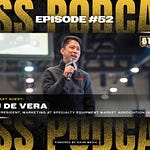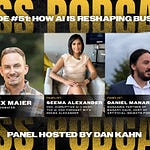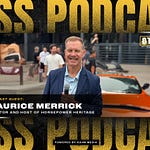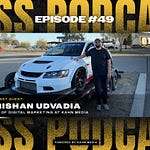Mike Good’s path to his current role as president of the Performance Racing Industry (PRI) is an interesting one. As the son of a long-time General Motors employee, Good was always around cars. During his teenage years, he started his own car detailing company and raced motocross. After college, Good continued his entrepreneurial journey and founded a medical technology company. He then became a management consultant after selling his company, which led him to a corporate leadership position with FinishMaster. From there, Good became the CEO of the automotive sound-deadening company Dynamat.
Now, Good leads the largest motorsports-focused industry trade association as PRI’s president. Well known for its PRI Show, held every year in Indianapolis, PRI’s role goes well beyond the show, serving as the motorsports industry’s key source for trends, business development, new products and more. Throughout his unique career, Good learned what it takes to be a leader and run a business. On this episode of the “Only The Strong Survive” podcast, Good shares the knowledge he gleaned from starting his own company, working for multiple larger corporations and running a prominent trade organization with host Dan Kahn.
Click on the icon above to listen to the entire episode, and here are our top five takeaways:
Being an entrepreneur involves being comfortable with risk.
Setbacks can make you stronger if you pay attention.
Having emotional intelligence is just as important as being intelligent.
Curiosity is often the driver of change and innovation.
Loyalty should always be reciprocal.
Risk is Required
There is no way around the fact that being an entrepreneur involves risk. Often, you need to make a serious commitment to that risk, too. According to Good, succeeding as an entrepreneur involves a different mindset and being comfortable leaping into the unknown. Pushing through tough times can be difficult without that commitment and attitude.
“I was a million dollars in debt on paper when I was 30 years old. I really rolled the dice,” says Good. “I think as an entrepreneur, you’ve got to be wired a little different. You’ve got to be willing to risk it all, be able to dust yourself off, get up and fight again another day. None of it went as I expected, but you are either learning or living. It is like this constant navigation and I learned so much through all of that.”
Let Setbacks Push You Forward
Setbacks, especially early in a career, can be difficult for anyone. However, those difficulties can actually help push you forward rather than backward. Good notes that most setbacks contain lessons to learn from that will help you evolve and get stronger. The key is to learn from them to avoid repeating the same mistakes.
“You probably remember every time you got kicked in the gut and every time you got down. Those are the learning points where you are like, okay, I am never going to be in this situation again. I am going to learn, evolve, move on and become stronger as a result of that,” says Good. “At the time, those kicks to the chest were really difficult to take in your 20s and 30s when you have this naïve trajectory of how things should be going. They end up shaping your resilience and your ability to navigate (adversity).”
EQ > IQ
Many people emphasize how knowledgeable a leader or manager is. For Good, possessing intelligence for a leadership role is always vital. However, your EQ (emotional intelligence) is more critical than your IQ. You can be extremely smart, but not understanding human emotions and how to navigate them will be severely limiting.
“It is more of a focus on the EQ than the IQ, EQ being emotional intelligence,” says Good. “I’ve seen some people in leadership roles who didn’t understand how to navigate human relationships, and that limited their trajectory. I am not saying I nailed it by any stretch, but it is something I am very conscious of, and I’m constantly trying to evolve.”
Curiosity is Critical
One trait Good always looks for when hiring is curiosity. For him, curiosity usually leads to someone challenging the status quo and questioning why things are done a certain way. Those questions often lead to changes that are almost always positive. Without that innate curiosity, an employee can just be “punching the clock.”
“My number one hiring trait is curiosity. I need people to come in and be curious. I want people to come in and question why we do things the way we do them,” says Good. “I want them to have a curious mind and feel like they have a voice regardless of the position and that their voice is going to be heard and acknowledged. I think when you try to attract that type of mind into an organization, it really permeates innovation and drives change.”
Loyalty Needs to go Both Ways
Most companies want loyal employees instead of a constant stream of turnover and a parade of new hires. However, some corporations fail to understand that loyalty is a two-way street. You can’t expect an employee to be loyal to you if it isn’t reciprocal. Building loyalty among your employees involves being loyal to them as they are to you.
“Loyalty is a double-edged sword. It is a great thing when it is properly caressed by both sides. Somebody once said that you own 50% of every relationship, and it is what you do with your 50% that matters,” says Good. “I think about that and I went all in on my 50% and wasn’t getting that back in a previous situation. But you learn those things early on, and they don’t make you jaded or negative. You learn from them and move on.”












